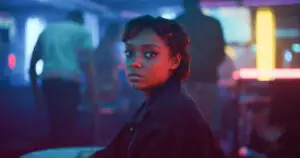Summary
Everything Now is a nuanced and sensitive exploration of eating disorders, mental health, and identity, as well as a sharply-written teen drama with a likable, talented ensemble.
There are lots of things that Netflix never gets credit for, but perhaps the most significant is its increasing library of forward-thinking teen dramas. Sure, Sex Education gets a lot of credit, but it’s the lower-key stuff, your Never Have I Ever and your Heartstopper, that quietly do the best work of exploring vital themes, crafting relatable characters, and redefining what it means to be an angsty teenager in a world where identity, sexuality, and mental health are at the forefront of popular culture like never before. And you can add Season 1 of Everything Now to the list.
Back in the streaming wildlands of 2017, Netflix released a film salaciously titled To the Bone, about Lily Collins playing an anorexic girl trying to recover under the guidance of a therapist played by Keanu Reeves, of all people. Based on the real experiences of its director Marti Noxon, it was well-intentioned but earned its share of backlash all the same, mostly for being presented in a way that would be triggering for sufferers of eating disorders of all kinds, let alone anorexics specifically.
One gets the sense that this is unavoidable; that it’s impossible, more or less, to depict a sensitive topic in any meaningful sense without making those to whom the topic is relevant slightly uncomfortable. But Everything Now is a nice reminder that there are better, more sensitive ways of doing it and that those ways yield better results.
Everything Now Season 1 review and plot summary
So, Everything Now is about a girl – Mia, played by Sophie Wilde, late of Talk to Me – with anorexia. But it’s also about many other things. After spending months in rehab – Stephen Fry, it turns out, is a much warmer, more believable therapist figure than Reeves – sixteen-year-old Mia returns to a high school, a social circle, and a home that seems to have moved on without her.
It isn’t just that she’s being patronized by concerned teachers and parents who treat her like she might explode at any moment. Her friends Becca (Lauryn Ajufo), Will (Noah Thomas), and Cam (Harry Cadby) have all become seasoned party animals in her absence, experiencing all their firsts – parties, hangovers, sexual encounters, the works – while she languished in rehab.
Mia decides she has some catching up to do, so she draws up a bucket list – almost immediately rechristened a “F*ck It Bucket” – of teen milestones to check off post-haste.
Everything Now – the title suddenly making more sense – takes the form of any coming-of-age drama about young adults trying to find their way in the world, but the frivolities are backdropped by Mia’s recovery, which doesn’t define her but continuously erects roadblocks that she must navigate, with a little help from her friends, to achieve some semblance of healing and, for want of a better word, “normality”.
This is accomplished through expert writing, directing – the show’s creator and writer Ripley Parker is joined by a who’s-who of seasoned YA directors, including Sex Education’s Alyssa McClelland – and acting from a dynamic young ensemble. Mia and her friends are funny, relatable, unique, and exist in a pleasing simulacrum of reality that doesn’t plane away all of life’s rougher edges like Heartstopper but also resists the temptation to play up debauchery in the way something like HBO’s Euphoria does.
READ: Where was Everything Now on Netflix filmed? Locations Breakdown
Mia’s eating disorders and mental health issues are treated with similar sensitivity. Everything Now knows it doesn’t need to strip her down to her underwear and hang its messaging on her bones; instead, it uses confidently written inner monologues to give voice to Mia’s anxieties and rationale, how she sees the world and how she imagines – often incorrectly – how it sees her in return.
This is not, then, a light-hearted, jaunty good time, since Mia’s recovery is, like all recoveries, fraught with ups and downs. But it’s also not salacious or mean-spirited, and it doesn’t peddle very real issues – every episode contains a trigger warning and directions to Wanna Talk About It?, Netflix’s resource for sufferers of the sometimes challenging matters its content explores – for cheap drama.
A sensitive and nuanced portrayal
Ultimately, Everything Now is a teen drama about a young girl, her friends, and her family, much more than it is a drama about anorexia, which is the way entertainment should be since nobody, least of all Mia, defines themselves entirely by the things that are perceived to be wrong with them.
The series treats Mia’s eating disorder and recovery with respect and nuance, but what’s smart about it is how it reminds both Mia and the audience that her eating disorder and recovery aren’t the only notable things about her. It acknowledges she’s vulnerable but calls her self-sabotage out for what it is; allows her friends to be there for her without stripping them of their own stories and problems; lets her family fundamentally care but in an imperfect, human way.
This, it occurs to me, is the best way of creating art that speaks to real people about real problems – by reminding them that there is more to them, and more to life, than they might realize.
What did you think of Everything Now Season 1? Comment below.




